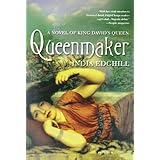For your reading delight, here are some excerpts from a blog hop about current projects. I was finishing up The Children of Kings at the time
Where did the idea come from for the book?
A couple of things. One is that Marion's original concept for Darkover centered on the clash of cultures, so I wanted to bring the Terran Federation back into the picture, but not in a nice, sedately friendly way, in a OMG terrible crisis about to descend upon us way. I also wanted to run away to live with the chieri, and Kierestelli (Regis and Linnea's daughter, from Hastur Lord) kindly offered to take me.
For this tale set mostly in the Dry Towns, I used as background not only The Shattered Chain but a very early (1961) “proto-Darkover” novel, The Door Through Space. The Door Through Space contained many elements familiar to Darkover readers, from jaco and the Ghost Wind to the names of people and places (Shainsa, Rakhal, Dry-towns). Marion was exploring a world in which Terrans are the visitors, and adventure lurks in the shadows of ancient alien cities. She drew upon and further developed this material in The Shattered Chain (1976).
These books reflected the growth of Marion’s vision, but each of them was also part of the times in which it was written. 1960s science fiction novels were often tightly-plotted, fast-paced, and short by today’s standards. Most, although by no means all, protagonists were male, and female characters were often viewed from that perspective, what today we call “the male gaze.” By the middle of the next decade, publishers were interested in longer, more complex works. Not only that, the women’s movement and the issues it raised influenced genre as well as mainstream fiction, opening the way for strong female characters who defined themselves in their own terms. If Marion had written The Shattered Chain a decade and a half earlier, I doubt it have found the receptive, enthusiastic audience it did. Her timing (as with The Mists of Avalon or The Heritage of Hastur) brilliantly reflected the emerging sensibilities of the times.
Now we live in a different world. This is not to say that the previous struggles have been resolved, but that much has changed in the social consciousness from 1976 to today. In writing The Children of Kings, I considered how Marion’s ideas about the Dry Towns (and any patriarchal desert culture) might have changed over the last three decades. The Shattered Chain, with its examination of the roles of women and the choice (or lack of choices) facing them, focused on only a few aspects of the Dry Towns culture. What if we went deeper, seeing it as complex, with admirable aspects as well as those we find abhorrent? With customs that we cannot truly comprehend but must respect, as well as those that resonate with our own? With men of compassion and women of power?
As the Dry Towns developed in my mind, I turned also to the theme that had characterized the early Darkover novels—the conflict between a space-faring technological race and the marvelously rich and romantic Domains, with their tradition of the Compact and the laran-Gifted Comyn. And now, adding to the mix, the ancient kihar-based Dry Towns.
What genre does your book fall under?
Like much of Darkover, it's technically sf, reads like fantasy. This one's a bit more like the earlier novels in that there are space ships and people from outer space and such. And chieri, native non-humans. Definitely romantic.
What is the one-sentence synopsis of your book?
When Terran smugglers arm the Dry Towns warlords with blasters, it's up to the grandson of Regis Hastur to save Darkover.
How long did it take you to write the first draft of your manuscript?
I typically take about a year to a year and half from beginning the outline to handing in the manuscript to my editor. It's hard to say "first draft, second draft..." as the amount of pre-writing and "oops-in-the-middle" varies so much. I also usually leap-frog rough drafting one project and revising another, interspersed with breaks for other deadlines (page proofs, short fiction for invitational anthologies). This one was no exception.
How long did it take you to write the first draft of your manuscript?
I typically take about a year to a year and half from beginning the outline to handing in the manuscript to my editor. It's hard to say "first draft, second draft..." as the amount of pre-writing and "oops-in-the-middle" varies so much. I also usually leap-frog rough drafting one project and revising another, interspersed with breaks for other deadlines (page proofs, short fiction for invitational anthologies). This one was no exception.
I should add that Matt Stawicki did a fantastic job on the cover. I love this painting!


